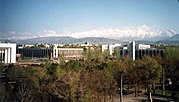Akayev flees Kyrgyzstan as protesters seize control of Bishkek
Thursday, March 24, 2005

Thousands of demonstrators, reportedly cheered on by residents, overran the Kyrgyz Presidential Palace, seizing control of Bishkek’s government buildings and forcing President Askar Akayev to flee the country.
Some 10,000 protesters gathered on central Ala-Too square in the country’s capital this morning. Fighting broke out between supporters of Akayev and the anti-Akayev protesters at the demonstration, and, although it was reportedly relatively minor, a Reuters witness reported hearing gun fire.
At the rally, the protesters gave speeches stating that the opposition would today finish taking control of the country. Keneshbek Dushebayev, newly appointed Interior Minister and chief of police for the city, called on them to give up their plans, but his pleas were dismissed by the protesters.
However, the Interior Minister assured them that the Akayev's regime would not use force against them, despite the fact that riot police suppressed a smaller demonstration the day before after he claimed that the use of force was lawful.
The Presidential Palace was reinforced with police forces and soldiers as about 5,000 protesters marched to the palace, chanting “down with the Akayev clans.”
The forces surrounding the building, which reportedly numbered in the hundreds, repelled an initial attempt to storm the building by the protesters, but the forces dispersed as about a thousand protesters fought back, armed with rocks and clubs, attempting to storm the building a second time.
Once inside, hundreds of protesters ransacked the building, throwing portraits of Akayev out the windows and destroying documents.
Thirty people were injured, according to medical officials.
Interfax reported that Akayev had flown to Kazakhstan with his family by helicopter earlier.
Former Vice President Felix Kulov, who was jailed in 2000, was among many political prisoners freed. He praised the "revolution made by the people."
"Let's keep the peace, let's not lose our head," he said into a megaphone on the steps of the palace, addressing the protesters. "I want to thank you that you weren't afraid and were peaceful and civilized."
Felix Kulov was quoted as saying that Akayev had resigned, though he denied this. "Akayev's resignation will come when we find him," he said.
The demonstrations began at about noon local time (0700 UTC), and, by 3:30 (1030 UTC), every government building in the capital was seized. The opposition quickly established a “Coordination Council of National Unity.”
"We will establish order. We will not allow looting. We will hold our own elections to start our rule," Kurmanbek Bakiyev, leader of the newly established Coordination Council said.
Confirming Interfax’s reports, he also said "Askar Akayev right now is not on Kyrgyz soil."
Former legislator Oksana Malevanaya, speaking for the Coordination Council on state television, now under opposition control, said that the former parliament would meet Thursday night.

Kyrgyz Supreme Court Chairman Kurmanbek Osmonov told the session of parliament that the court had declared the elections invalid. He reportedly stated that the court considered the convened former legislature as the legitimate one.
"It's not the opposition that has seized power, it's the people who have taken power. The people. They have been fighting for so long against corruption, against that [Akayev] family," Ulan Shambetov, an opposition activist, said.
Presidential elections are reportedly likely to be held in May or June, followed by parliamentary elections in the fall. The old parliament will serve as the legitimate legislature until the elections are be held.
Top government officials, including Prime Minister Nikolai Tanayev, who cancelled his trip to Osh for negotiations today in light of the new developments, and State Secretary Osmonakun Ibraimov, resigned.
Opposition MP Ishinbai Kadyrbekov, former parliamentary speaker, was named acting president and newly freed Felix Kulov was named head of the ministries of security in the country by the parliament.
Elsewhere, in Batken, the third regional center in the south after now opposition controlled Osh and Jalal-Abad, hundreds of protesters broke through police lines and seized government buildings.
Monica Whitlock, a correspondent for the BBC, notes she observed that some protesters carried pink banners while others carried yellow ones, suggesting that the opposition is fractured.
Widespread looting reportedly continued overnight, as law enforcement officers were not present on Bishkek's streets. Bishkek was described as sinking into a state of "anarchy" by one observer, as gangs of people roamed the streets and plundered stores of consumer goods. Several Bishkek residents blamed protesters from the south for the lawlessness.
"There are looters and there are no police to stop them," Felix Kulov told Reuters. "The law enforcement bodies are completely demoralised."
Amid the continued instability, Kazakhstan tightened security along its border with Kyrgyzstan, as Uzbekistan and Tajikistan have recently done.
Related stories
edit- "New Kyrgz interior minister says force may be used, riot police clash with protesters in Bishkek" — Wikinews, March 23, 2005
- "Kyrgyz government declares elections valid, refuses to declare state of emergency as opposition cements control of the south" — Wikinews, March 23, 2005
Sources
edit- Richard Spencer. "Kyrgyzstan president flees Tulip Revolution" — Telegraph, March 25, 2005
- "Kyrgyzstan capital paralyzed by protests" — AP, March 25, 2005
- "AKAYEV ADMINISTRATION COLLAPSES IN KYRGYZSTAN, SENDING TREMORS ACROSS CENTRAL ASIA" — Eurasianet, March 24, 2005
- "KYRGYZ OPPOSITION HOPES RUSSIA WILL NOT MISUNDERSTAND SITUATION" — RIA Novosti, March 24, 2005
- Steve Gutterman. "Opposition Takes Control of Kyrgyzstan" — AP, March 24, 2005
- "Kyrgyz Clashes in Capital, Gunshots Heard" — Reuters, March 24, 2005
- "Kyrgyz Opposition on Move to Topple President" — Cihan, March 24, 2005
- "KYRGYZSTAN: OPPOSITION LEADER APPOINTED ACTING PRESIDENT" — RIA Novosti, March 24, 2005
- "Top Kyrgyz official tenders resignation" — Reuters, March 24, 2005
- Dmitry Solovyov. "Kyrgyz opposition seize power" — Reuters, March 24, 2005
- "Report: Supreme Court invalidates Kyrgyz parliamentary elections" — AP, March 24, 2005
- "Kyrgyzstan names interim leader" — BBC, March 24, 2005
- "Kyrgyz regime collapses as opposition seizes control" — AFP, March 24, 2005